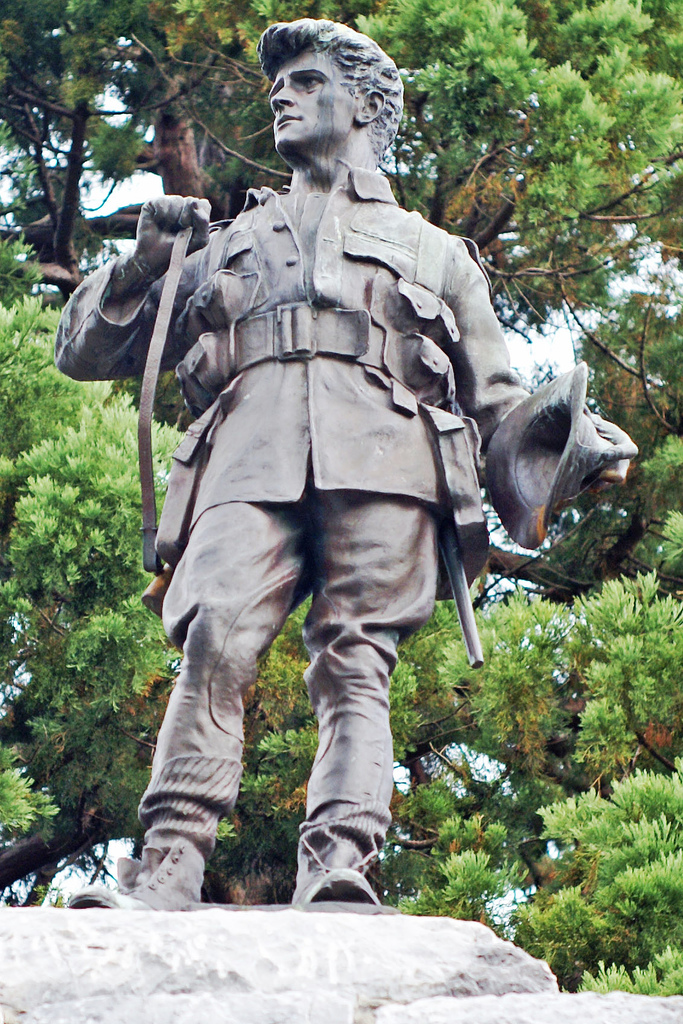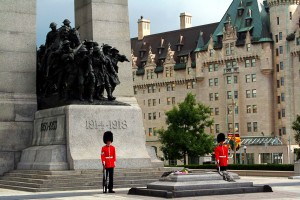
In May 1927 Joe Lynch fell overboard from a ferry in Sydney Harbour. He was drunk and his pockets were filled with beer bottles which helped drag him down.
This happened while the Sydney Harbour bridge was under construction and the only way to cross Port Jackson was by boat.
Joe was a cartoonist who worked with Kenneth Slessor for Smith’s Weekly magazine in Sydney. The pair also worked together for Punch magazine in Melbourne for a time. The night he died Lynch left work and met his brother Guy, Guy’s wife Marge, and Frank Clancy, another Irish Australian journalist who worked for Labor Daily. They were boozing hard and loaded up with bottles when they boarded the ferry Kiandra at Circular Quay. Somewhere along the way Joe leaned too far back over the rail and slipped away beneath the Harbour waters.
That might have been the end for Joe Lynch, an embarrassing end quickly forgotten. But eight years later his old pal Kenneth Slessor had a bit of an epiphany as he listed to the watch bells ring from the Warships in the Harbour. He penned his most famous, and one of Australia’s greatest poems. Kenneth was born on this day in 1901. Happy Birthday Kenneth Slessor.
Because of Slessor Lynch has become the most famous, and possibly the most preposterous, drowning in Sydney Harbour.
Below the poem you will find a photo of a war memorial in Devonport, Auckland, New Zealand. It was sculpted by Guy Lynch using Joe Lynch as his body model. It depicts a Kiwi soldier of WW1 coming off duty, and is nicknamed “The Untidy Soldier”. This statue is the subject of “The Digger and the Faun” a poem by Michele Leggott. So Joe Lynch is immortalised in poetry twice! Not a bad memorial.
Five Bells ; by Kenneth Slessor
Time that is moved by little fidget wheels
is not my time, the flood that does not flow.
Between the double and the single bell
of a ship’s hour, between a round of bells
from the dark warship riding there below,
I have lived many lives, and this one life
of Joe, long dead, who lives between five bells.
Deep and dissolving verticals of light
ferry the falls of moonshine down. Five bells
coldly rung out in a machine’s voice. Night and water
pour to one rip of darkness, the Harbour floats
in the air, the Cross hangs upside-down in water.
Why do I think of you, dead man, why thieve
these profitless lodgings from the flukes of thought
anchored in time? You have gone from earth,
gone even from the meaning of a name;
yet something’s there, yet something forms its lips
and hits and cries against the ports of space,
beating their sides to make its fury heard.
Are you shouting at me, dead man, squeezing your face
in agonies of speech on speechless panes?
Cry louder, beat the windows, bawl your name!
But I hear nothing, nothing…only bells,
five bells, the bumpkin calculus of time.
Your echoes die, your voice is dowsed by life,
there’s not a mouth can fly the pygmy strait –
nothing except the memory of some bones
long shoved away, and sucked away, in mud;
and unimportant things you might have done,
or once I thought you did; but you forgot,
and all have now forgotten – looks and words
and slops of beer; your coat with buttons off,
your gaunt chin and pricked eye, and raging tales
of Irish kings and English perfidy,
and dirtier perfidy of publicans
groaning to God from Darlinghurst.
Five bells.
Then I saw the road, I heard the thunder
tumble, and felt the talons of the rain
the night we came to Moorebank in slab-dark,
so dark you bore no body, had no face,
but a sheer voice that rattled out of air
(as now you’d cry if I could break the glass),
a voice that spoke beside me in the bush,
loud for a breath or bitten off by wind,
of Milton, melons, and the Rights of Man,
and blowing flutes, and how Tahitian girls
are brown and angry-tongued, and Sydney girls
are white and angry-tongued, or so you’d found.
But all I heard was words that didn’t join
so Milton became melons, melons girls,
and fifty mouths, it seemed, were out that night,
and in each tree an Ear was bending down,
or something that had just run, gone behind the grass,
when blank and bone-white, like a maniac’s thought,
the naphtha-flash of lightning slit the sky,
knifing the dark with deathly photographs.
There’s not so many with so poor a purse
or fierce a need, must fare by night like that,
five miles in darkness on a country track,
but when you do, that’s what you think.
Five bells.
In Melbourne, your appetite had gone,
your angers too; they had been leeched away
by the soft archery of summer rains
and the sponge-paws of wetness, the slow damp
that stuck the leaves of living, snailed the mind,
and showed your bones, that had been sharp with rage,
the sodden ectasies of rectitude.
I thought of what you’d written in faint ink,
your journal with the sawn-off lock, that stayed behind
with other things you left, all without use,
all without meaning now, except a sign
that someone had been living who now was dead:
“At Labassa. Room 6 x 8
On top of the tower; because of this, very dark
and cold in winter. Everything has been stowed
into this room – 500 books all shapes
and colours, dealt across the floor
and over sills and on the laps of chairs;
guns, photoes of many differant things
and differant curioes that I obtained…“
In Sydney, by the spent aquarium-flare
of penny gaslight on pink wallpaper,
we argued about blowing up the world,
but you were living backward, so each night
you crept a moment closer to the breast,
and they were living, all of them, those frames
and shapes of flesh that had perplexed your youth,
and most your father, the old man gone blind,
with fingers always round a fiddle’s neck,
that graveyard mason whose fair monuments
and tablets cut with dreams of piety
rest on the bosoms of a thousand men
staked bone by bone, in quiet astonishment
at cargoes they had never thought to bear,
these funeral-cakes of sweet and sculptured stone.
Where have you gone? The tide is over you,
the turn of midnight water’s over you,
as Time is over you, and mystery,
and memory, the flood that does not flow.
You have no suburb, like those easier dead
in private berths of dissolution laid –
the tide goes over, the waves ride over you
and let their shadows down like shining hair,
but they are Water; and the sea-pinks bend
like lilies in your teeth, but they are Weed;
and you are only part of an idea.
I felt the wet push its black thumb-balls in,
the night you died, I felt your eardrums crack,
and the short agony, the longer dream,
the Nothing that was neither long nor short;
but I was bound, and could not go that way,
but I was blind, and could not feel your hand.
If I could find an answer, could only find
your meaning, or could say why you were here
who now are gone, what purpose gave you breath
or seized it back, might I not hear your voice?
I looked out my window in the dark
at waves with diamond quills and combs of light
that arched their mackerel-backs and smacked the sand
in the moon’s drench, that straight enormous glaze,
and ships far off asleep, and harbour-buoys
tossing their fireballs wearily each to each,
and tried to hear your voice, but all I heard
was a boat’s whistle, and the scraping squeal
of seabirds’ voices far away, and bells,
five bells. Five bells coldly ringing out.
Five bells.

-=o0o=-
This site is available for free and I make no money from any ads you see here. If you would like to show your appreciation feel free to leave a comment or you can buy me a coffee! http://buymeacoffee.com/DonalClancy




